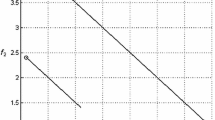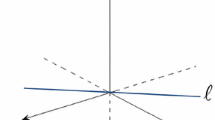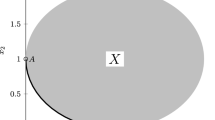Abstract
In equitable multiobjective optimization all the objectives are uniformly optimized, but in some cases the decision maker believes that some of them should be uniformly optimized according to the importance of objectives. To solve this problem in this paper, the original problem is decomposed into a collection of smaller subproblems, according to the decision maker, and the subproblems are solved by the concept of wr-equitable efficiency, where w ∈ R m+ is a weight vector. First some theoretical and practical aspects of Pwr-equitably efficient solutions are discussed and by using the concept of Pwr-equitable efficiency one model is presented to coordinate weakly wr-equitable efficient solutions of subproblems. Then the concept of Pw∞-equitable is introduced to generate subsets of equitably efficient solutions, which aims to offer a limited number of representative solutions to the decision maker.
Similar content being viewed by others
References
Cho, K.I., Kim, S.H. An improved Interactive hybrid method for the linear multi-objective knapsack problem. Comput. Oper. Res., 24(11): 991–1003 (1997)
Engau, A. Domination and Decomposition in Multiobjective Programming. Ph.D. Thesis, Department of Mathematical Sciences, Clemson University, 2007
Engau, A., Wiecek, M.M. Interactive coordination of objective decompositions in multiobjective programming. Manag. Sci., 54: 1350–1363 (2008)
Farina, M., Amato, P. On the optimal solution definition for many criteria optimization problems. In: Proceedings of the NAFIPS-FLINT International Conference, 2002, 233–238
Katagiri, H., Sakawa, M., Kato, K., Nishizaki, I. Interactive multiobjective fuzzy random linear programming: Maximization of possibility and probability. European J. Oper. Res., 188: 530–539 (2008)
Kostreva, M.M., Ogryczak, W. Linear optimization with multiple equitable criteria. RAIRO Oper. Res., 33(3): 275–297 (1999)
Kostreva, M.M., Ogryczak, W., Wierzbicki, A. Equitable aggregations in multiple criteria analysis. European J. Oper. Res., 158(2): 362–377 (2004)
Lorenz, M.O. Methods of measuring the concentration of wealth. J. Amer. Statist. Assoc., 70: 209–219 (1905)
Mahmodinejad, A., Foroutannia, D. Piecewise equitable efficiency in multiobjective programming. Oper. Res. Lett., 42: 522–526 (2014)
Marshall, A.W., Olkin, I. Inequalities: Theory of Majorization and Its Applications. Academic Press, New York, 1979
Molina, J., Santana, L.V., Hernandez-Diaz, A.G., Coello, C.A., Caballero, R. g-Dominance: Reference point based dominance for multiobjective metaheuristics. European J. Oper. Res., 197: 685–692 (2009)
Padhye, N., Deb, K. Multi-objective optimisation and multicriteria decision making in SLS using evolutionary approaches. Rapid Prototyping J., 17(6): 458–478 (2011)
Singh, V.K. Equitable Efficiency in Multiple Criteria Optimization. Ph.D. Thesis, Clemson University, 2007
Yang, J.B. Multiple Criteria Decision Making Methods and Applications. Hunan Publishing House, Changsha, PR China, 1996
Yang, J.B. Minimax reference point approach and its application for multiobjective optimisation. European J. Oper. Res., 126: 541–556 (2000)
Zio, E., Baraldi, P., Pedroni, N. Optimal power system generation scheduling by multi-objective genetic algorithms with preferences. Reliab. Eng. Syst. Safe., 94: 432–444 (2009)
Zio, E., Bazzo, R. A clustering procedure for reducing the number of representative solutions in the Pareto Front of multiobjective optimization problems. European J. Oper. Res., 210(3): 624–634 (2011)
Author information
Authors and Affiliations
Corresponding author
Rights and permissions
About this article
Cite this article
Foroutannia, D., Mahmodinejad, A. Piecewise w∞-equitable efficiency in multiobjective programming. Acta Math. Appl. Sin. Engl. Ser. 33, 825–836 (2017). https://doi.org/10.1007/s10255-017-0686-x
Received:
Revised:
Published:
Issue Date:
DOI: https://doi.org/10.1007/s10255-017-0686-x




